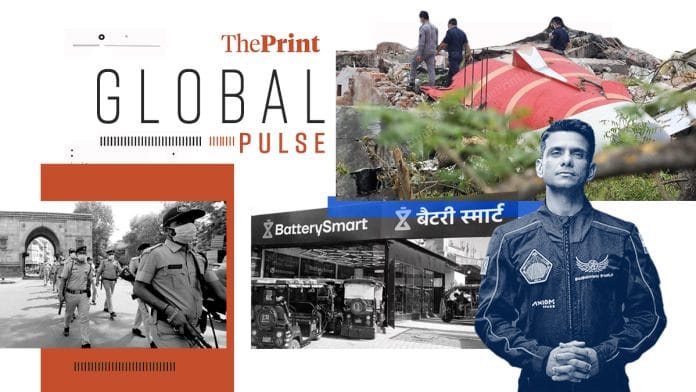New Delhi: Families of those whose lives were cut short by the Air India plane crash in Ahmedabad have been left with a slew of questions following the release of the preliminary investigation report into the incident, report Mujib Mashal and Suhasini Raj in The New York Times.
“The report included only a brief, confusing snippet of the conversation recorded in the cockpit between the pilots, where one asks whether the other moved the fuel switch, to which the second responds that he hadn’t,” they write.
“The fuel pump was shut off. That’s what they are saying,” Ravi Thakur, 32, who lost his mother and two-year-old daughter in the tragedy, is quoted as saying. “But how can that be possible? That within seconds it was working fine, and then all of a sudden it was shut off.”
The brother of another victim says, “We were hoping for more than this.”
The investigation will continue, and further evidence will be reviewed, but conclusive answers in plane crash investigations take months and, in some instances, years, the NYT report says.
Washington Post’s Pranshu Verma, Tanbirul Miraj Ripon and Sahal Qureshi report on the alleged “crackdown” on thousands of people, “most of them Muslims”, following the Pahalgam attack in April, with Gujarat Home Minister Harsh Sanghavi “pledging to root out each and every infiltrator”.
“Officials ordered raids in slums populated by Muslim laborers, branding most of those detained as illegal immigrants from Bangladesh who posed a threat to national security. While some of those targeted lacked legal status, many appeared to be Indian citizens; others were legal residents after living in the country for decades, family members said,” the report reads.
It involved “mass home demolitions, arbitrary detentions, allegations of beatings”, the report further says, adding that the action was “most severe” in Assam and Gujarat.
Shubhanshu Shukla, the first Indian to visit the International Space Station, is fuelling the dreams of a legion of students, reports Kiran Mehta in The Guardian.
“Imrana Rahaman and Labiba Naaz, both 15, are thrilled to learn that the ISS will be visible on certain nights and the two girls are hoping to catch a glimpse of it and wave to their hero. A few years ago, a science teacher introduced them to a planetarium app. The girls don’t own mobile phones, but downloaded the app on to their parents’ phones,” reads the report.
Battery-swapping, the change of depleted batteries for fresh ones in five minutes or less, could potentially be the next big thing among Indian venture capitalists—making batteries more suitable for “smaller delivery vehicles in dense urban areas”, reports Kenza Bryan in Financial Times.
“The firm (Leapfrog Investments, a private equity firm) led the funding round last year for Battery Smart, India’s largest battery-swapping network for electric two- and three-wheel vehicles which is also backed by MUFG bank and Panasonic. Californian private equity firm Rising Tide Energy led the most recent June capital raising,” the report notes.
BBC looks at the life of Kundanlal, a machine tool manufacturer from Ludhiana who rescued five Jewish families during the Holocaust.
“Struggling with diabetes and hemorrhoids, Kundanlal, then 45, sought new treatments and read about a specialist in Vienna. In 1938, while recovering from surgery there, he met Lucy and Alfred Wachsler, a young couple expecting their first child. From them, he learned of rising antisemitic violence and the destruction of Jewish lives,” reads the report, which derives from his grandson Vinay Gupta’s family memoir A Rescue In Vienna.
“Over the next few months, he met other men. Encouraged by this success, Kundanlal placed newspaper adverts seeking skilled workers willing to relocate to India,” it adds, noting that he offered each Jewish respondent a job, financial guarantees, and support to secure Indian visas.
(Edited by Nida Fatima Siddiqui)






